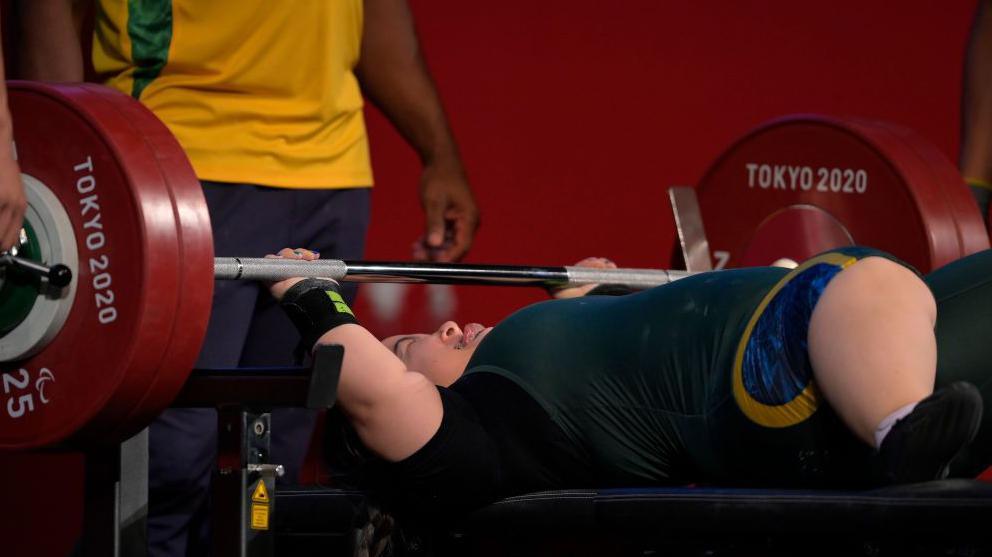Paralympics 2024: A guide to Para-powerlifting at the Paris Games

Brazil's Mariana D'Andrea will be hoping to retain her Paralympic title in Paris
- Published
Key information
Dates: 4-8 September
Venue: Porte de La Chapelle Arena
Gold medals on offer: 20
What are the rules and classifications of Para-powerlifting?
Paralympic powerlifting is a bench press competition, with athletes lying flat on a specially designed bench and then aiming to lower a horizontally weighted bar from arm's length to the chest and return the bar under control to the same starting position.
The three judges indicate a successful lift with white lights, and an unsuccessful attempt with red lights.
Athletes may make three lifts during the competition and must increase the weight attempted by at least 1kg following a successful lift. Each athlete has three attempts at each lift. A fourth lift may also be attempted for a record, but this does not count towards the final result of the competition.
The athlete producing the greatest result in their category - and within the three scoring competition lifts - takes gold.
In the event of a tie, the winner is the athlete that weighed in the lightest and lifted the joint heaviest weight. If both athletes have an identical body weight, a reweigh is done.
There are 10 different weight categories for both men and women. The men's classes are up to 49kg, up to 54kg, up to 59kg, up to 65kg, up to 72kg, up to 80kg, up to 88kg, up to 97kg, up to 107kg and over 107kg.
The women's classes are up to 41kg, up to 45kg, up to 50kg, up to 55kg, up to 61kg, up to 67kg, up to 73kg, up to 79kg, up to 86kg and over 86kg.
Athletes are classified by bodyweight alone, which means those with different impairments compete for the same medals. Athletes are weighed two hours before their competition.
Each competition is a straight final, although two groups are held in weight divisions where there are more than eight competitors. When there are two 'flights', or groups, these are known as A and B and are predetermined by athletes' world rankings. The B group will always lift first and the winner is on the whole most likely to come from the A group.
Which athletes will be competing for GB?
Tokyo bronze medallists Olivia Broome and Louise Sugden are back again, along with London and Rio bronze medallist Zoe Newson.
Broome is world champion in the -50kg event and will hope to complete a double and win a first gold for GB in the sport since Emma Brown in Athens in 2004.
Sugden has fought her way back to fitness after a shoulder injury to compete in Paris while Newson, who returned to the sport after having her son Duncan in 2019, won bronze at the last Worlds.
Reigning European champion and Commonwealth silver medallist Mark Swan will be hoping to make an impact on his Paralympic debut.
Who are the other challengers?
Mexico's Amalia Perez is one of the greats of the sport. The 51-year-old will be competing in her seventh Games and has four golds and two silvers to her name and will aim for another in the up to 61kg division.
After three golds in a row, Egypt's Sherif Osman finished second in the up to 59kg event in Tokyo and wants to claim his title back.
Le Van Cong created history at Rio 2016 by becoming Vietnam's first Paralympic gold medallist and after taking silver in Tokyo, the world champion in the up to 48kg division will be hoping to complete a global double.
Did you know?
Games debutant Liam McGarry was diagnosed with transverse myelitis, inflammation of the spinal cord, when he was in his first year at Bournemouth University.
A keen footballer, he went to the 2018 Spinal Unit Games as part of his rehab and lifted 137kg and his Para-powerlifting career started.
Tokyo came too soon but McGarry has gone from strength to strength in the over 107kg event and prior to Paris had a best lift of 232kg - that's around five Simone Biles's!
ParalympicsGB Tokyo 2020 medals
Three bronzes - Micky Yule, Olivia Broome and Louise Sugden